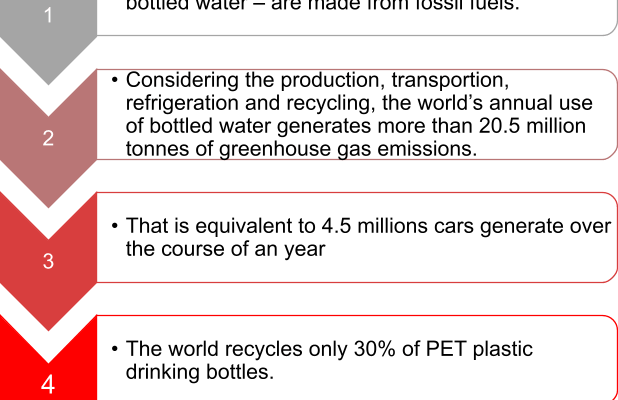The United Arab Emirates (UAE) bottled water market has been valued at $798 million in 2020 and has an estimated Compound Annual Growth Rate (CAGR) of 10.81 percent for the next five years (2021-2026). Bottled water sales saw an unprecedented increase during the Covid-19 pandemic, especially during the early stages of the pandemic when consumers were stockpiling essential food and beverages. Additionally, the UAE faces several water-management challenges such as – scarcity of groundwater reserves, high salinity levels in existing groundwater sources, high cost of producing clean drinking water, limited reuse of water, and limited collection and treatment of wastewater outside of urban areas. The UAE had been ranked the eighth largest per-capita consumer of bottled water in the world owing to high temperatures, low rainfall, and increasing demand with increasing population. Sani Water’s new blog series titled “Bottled Water Series” will cover various elements of the bottled water industry viz. 1) factors contributing to rise of bottled water and impact of bottled water on human health, and 2) manufacturing process of bottled water and environmental impacts of bottled water. 3) climate change impact and 4) alternatives to plastic bottled water. Sani Water has been at the forefront of providing their customers with the latest research topics in the drinking water industry that are applicable on a regular basis. With “Bottled Water Series”, Sani Water aims to educate and inform their customers about the severe health, environmental, sustainable, and economic impacts of using bottled water.
BOTTLED WATER AND CLIMATE CHANGE
Use of bottled water has increased over the past few decades. Some contributing factors to this increase are- information from the media, sensory perception, risk perception, and sociocultural, psychological and economic reasons. There is a common perception that bottled water is healthier, more convenient and tastier than tap water. This article highlights the impacts of bottled water consumption, using the sustainability framework. Almost all plastic is derived from materials (like ethylene and propylene) made from fossil fuels (mostly oil and gas). The process of extracting and transporting those fuels, then manufacturing plastic creates billions of tons of greenhouse gases. For example, 4% of the world’s annual petroleum production is diverted to making plastic, and another 4% gets burned in the refining process. The entire life cycle of bottled water uses fossil fuels, contributes to global warming, and causes pollution. The management of all the plastic that then goes into circulation is equally troubling. Of the almost 3 million tons of plastic produced each year, 95% is discarded after a single use. Less than 12% is recycled, which leaves a staggering amount to be disposed of – in landfills or incinerated. Studies indicate that approximately 46,000 pieces of plastic trash are floating on the ocean per square mile. The plastic poses a safety hazard to aquatic life by leaching chemicals into the ocean and disrupting ecosystems. Each plastic bottle can take up to one thousand years to decompose, leaking dangerous and harmful chemicals during the process. Some toxins leaked are carcinogenic and could cause reproductive disabilities. Incineration of plastic bottles produces toxic by-products such as chlorine gas and ash containing heavy metals.
REFLECTION POINTS

The more plastic we make, the more fossil fuels we need, the more we exacerbate climate change. The only way we can now address the problem is to curb the production of plastic, especially of the single-use variety, and to ramp up recycling. The plastic is composed of non-renewable fossil fuels, which are a finite resource, and the use of this product encourages mining which has associated environmental impacts as listed below:
- The entire life cycle of bottled water uses fossil fuels, contributes to global warming, and causes pollution.
- Plastic bottles can take 450 years to decompose, so a plastic bottle you throw away tomorrow could still be taking up space in the ground or floating in the ocean centuries from now.
Source: Cycle of a plastic bottle (angelwater.com/blog/life-cycle-plastic-water-bottle/)
- When plastic does break down, it releases harmful chemicals into the environment. Plastic leachate like BPA and phthalates can seep into the soil and contaminate the groundwater we rely on for drinking, bathing, and washing food and cookware.
- Plastic does not always make it to a landfill, either. Some of it makes its way into the ocean, where it pollutes vital aquatic habitats. At least 5.25 trillion plastic pieces have made it into the world’s oceans. When marine animals mistake plastic for food and eat it, they may become sick and die.
- By 2050, 99% of all seabird species will have ingested plastic — and 95% of the members of those species will have ingested plastic. Some estimates also suggest that by 2050, the ocean will contain more plastic by weight than fish.
- Plastic water bottles make up a substantial portion of this waste. Drinking tap water instead helps cut down on plastic pollution and keep marine ecosystems and wildlife healthy.

REFERENCES
- //www.ncbi.nlm.nih.gov/pubmed/31491924
- //www.mordorintelligence.com/industry-reports/uae-bottled-water-market
- //www.trade.gov/knowledge-product/united-arab-emirates-water
- //www.wwf.org.au/news/blogs/plastic-waste-and-climate-change-whats-the-connection#gs.52cj4v
- //www.oceancrusaders.org/lessons/6th%20Lesson%20Bottled%20Water.pdf
- //sustainability.uq.edu.au/projects/recycling-and-waste-minimisation/real-cost-bottled-water
- //green.harvard.edu/tools-resources/green-tip/reasons-avoid-bottled-water
- //angelwater.com/blog/life-cycle-plastic-water-bottle/
The post <span style="color: #4690cd;">B</span>ottled Water Series: Climate Change Impacts appeared first on SaniWater.
